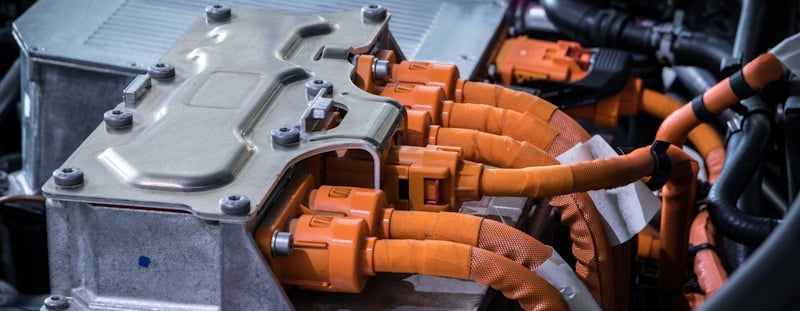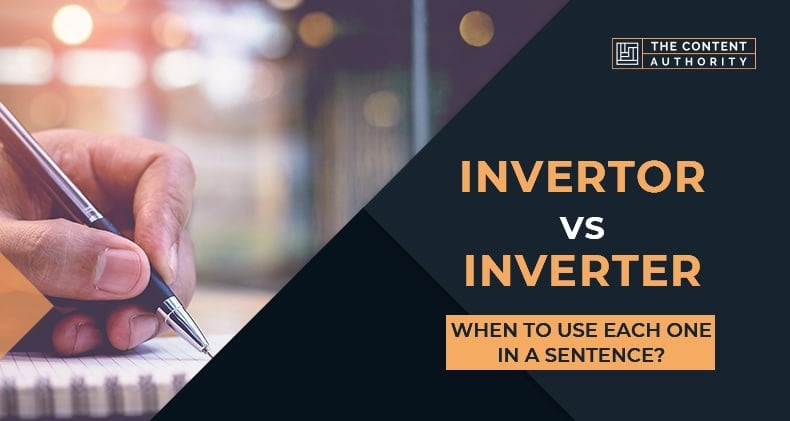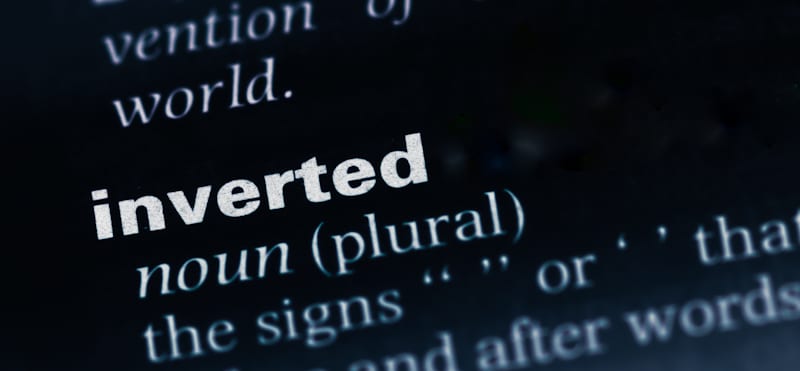The English language is full of words that share similarities. Sometimes these words are not even closely related to each other. It is the case for the terms “invertor” and “inverter.” Why are these words so similar to each other? What’s their meaning and difference?
“Inverter” is a noun you use when referring to something that produces or is being interchanged. “Invertor” is a noun people use to refer to body muscles that create inversion movements in our feet.
Even though these two words are written similarly, their meanings are not related. Let’s review more details so we can understand these terms better.

Understanding The Terms “Invertor” And “Inverter”
Part of understanding them is learning where they came from. Additionally, we will review the meaning they have had throughout the years.
Etymology Of “Invertor” And “Inverter”
Both words have a root word, “invert,” and the suffix “-or” and “-er,” respectively.
The English word “invert” comes from the French expression “invertir.” It got into English somewhere between the 15th and 16th centuries. The French took it from the Latin verb “inverto,” a term people used to express reverse, exchange, or retreat.
The suffixes “-or” and “-er” help convert a verb into a noun.
Meaning
Depending on the context, you can find several meanings related to these terms. The following are a list of definitions for each case.
- In electricity, an inverter is a device that helps to change direct current (DC) into alternating current (AC).
- Generally, an inverter can be someone who changes the position or order of things.
- In anatomy, an invertor is a muscle that turns legs or arms inwards.
However, it is essential to note that most dictionaries don’t define the word “invertor.” There are a few exceptions. But, auto-correction tools might indicate the word is misspelled and will try to change it to “inverter.”
How People Use The Terms “Invertor” And “Inverter”
“Inverter” is a term widely used, especially in electronic and electric devices. For instance, battery-powered UPS are often called “inverters.” These devices change to AC when they need to provide electric power. If the UPS needs to supply energy to charge the batteries, it will convert AC into DC.
Additionally, you can find several home appliances, such as air conditioners and fridges, labeled as “inverters.” It means that those refrigeration units require less electricity to operate.
The word inverter is also present in solar power. It takes the energy from the solar panels and converts it into AC electricity that electric devices can use. The most popular type of solar inverter is the string. But, there are two other options available in the market.
When it comes to the word “invertor,” people use it to refer to ankle invertors. They are a pair of muscles that help you to move your foot towards the inside.
The Phonetics Of “Inverter” And “Invertor”
The pronunciation of these terms is the same. The IPA symbol for both words is /ɪnˈvɝː.t̬ɚ/. In this word, we have three syllables. As you can see, marked with an apostrophe, the stressed syllable is the second one.
The Sounds Of The Words “Inverter” And “Invertor”
The sounds in this word are:
- ɪ: which is the short “i” sound. It is an unstressed vowel with a sharp sound; This is the same sound as in the word “bit.”
- n: it is the first consonant sound and marks the end of the first syllable.
- v: is a voiced labiodental sound. As it is the start of the stressed syllable, you will put more emphasis on this sound.
- ɝ: It is a combination of the “e” and “r” sounds. It is present here because we have an “er” in a stressed syllable.
- t̬: known as flap “t,” it is the same sound you find in the word “water.” You will often find it preceded by an “r,” which is the case in the word “forty.”
- ɚ: it is another combination of the “e” and “r” sounds. In this case, because it is not a stressed syllable, you can find the vowel sound is a schwa sound.
The Pronunciation Of The Words “Inverter” And “Invertor”
Now that you know the phonetic symbols, let’s talk about how to pronounce these words.
First, you will start with your mouth relaxed in a mid-open position; your tongue rests at the bottom of your mouth. Vibrate your vocal cords to make the /ɪ/ sound. Finally, move your tongue to seal your palate while still vibrating your vocal cords to end with the /n/ sound.
The second syllable starts with your teeth touching your bottom lip. Vibrate your vocal cords to make the /v/ sound. To produce the /ɝ/ sound, start with an open mouth and relaxed lips. The tip of your tongue should point upwards without touching your palate, then vibrate your vocal cords.
The final syllable starts with the flap t sound. As we mentioned, it is the same t sound you find in “water.” Your tongue will remain in its upward curved position, then release it to the bottom of your mouth and quickly change to the final sound. Here, we have another r-colored sound, but this one is more relaxed. To make the /ɚ/ sound, you will almost forget about the “e.” Since it is a weak vowel, you will move into the “r” sound.
The most critical and challenging sounds in this word are the two r-colored vowel sounds. “r” consonants tend to be more difficult for non-native speakers. But, they will make a difference and will help you to communicate with a natural pronunciation.
Other Terms Related To The Word “Inverter”
Here we have a list of words that convey a similar meaning to the terms we review in this article.
Synonyms
Some terms that are similar to “inverter” include:
- Alternator
- Transformer
- Regulator
- Convertor
- Generator
- Exchanger
- Reverser
- Interpreter
- Transducer
- Commutator
Common Questions
Is a converter and an inverter the same thing?
No, they are not the same thing. While they both transform electricity, the converter changes it from AC to DC, and inverters change the current from DC to AC.
Are inverters better than generators?
Yes, they are. Inverters offer some advantages that generators can’t compete with. For instance, generators require fuel to run, while inverters will only need charged batteries.
Example Sentences Using “Inverter” And “Invertor”
Here we have some sample sentences that use the words “inverter” and “invertor.”
- The two invertor muscles in the ankle are the tibialis anterior and tibialis posterior
- Due to its absence in many major dictionaries, people think “invertor” is just a typo.
- An inverter should be capable of providing energy for roughly 6 hours, 8 hours max.
- The advantage of using an inverter instead of a generator is that you can choose a green energy source instead of using fossil fuels.
- You will need more than a 400-watt inverter if you want to run your 55 inches TV.
Final Thoughts About The Terms
“Inverter” and “invertor” seem to be similar words, but there’s no definite answer that can claim they are, in fact, the same. Some dictionaries can’t define the word “invertor.” But, the term is used in anatomy to talk about a pair of leg muscles that allow your foot to move inwards and outwards.
On the other hand, the term “inverter” is widely used in electricity. You can find people using it to talk about solar power. Additionally, some appliances, especially those dedicated to refrigeration, use inverter technology to make them more efficient.
We hope this article can give you more clarity about these two words.
Shawn Manaher is the founder and CEO of The Content Authority. He’s one part content manager, one part writing ninja organizer, and two parts leader of top content creators. You don’t even want to know what he calls pancakes.


